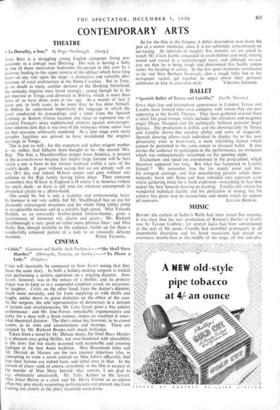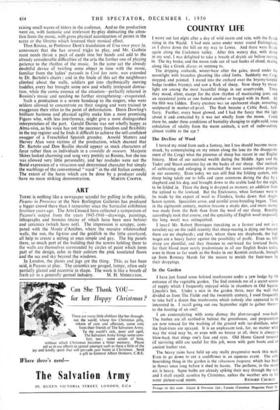MUSIC
BEFORE the curtain at Sadler's Wells had been raised five minutes, it was clear that the new production of Rossini's Barber of Seville was by Tyrone Guthrie ; for several kicks had been administered in the seat of the pants, Fiorello had stumbled grotesquely in all improbable directions and his hired musicians had placed an enormous double-bass in the middle of the stage, all this side-play •
raising small waves of titters in the audience. And so the production went on, with fantastic and irrelevant by-play distracting the atten- tion from the music, with gross physical accentuation of points in the score or the libretto which lessened their musical effect.
Thus Rosina, in Professor Dent's translation of Una voce poco fa, announces that she has several tricks to play, and Mr. Guthrie must needs thrust a pack of ,cards into her hands and add to the already considerable difficulties of the aria the further one of playing patience to the rhythm of the music. In the same act the already doubtful device of twirling some object in time with the music, familiar from the ladies' parasols in Cosi fan tune, was extended to Dr. Bartolo's chairs ; and in the finale of this act the neighbours climbed about the walls, soldiers got into rhythmically moving huddles, every bar brought some new and wholly irreltvant distrac- tion, while the comic essence of the situation—perfect[y released in Rossini's music and needing no further strengthening—evaporated.
Such a production is a severe handicap to the singers, who were seldom allowed to concentrate on their singing and were trained to exaggerate their roles to the point of deformation. Denis Dowling's brilliant baritone and physical agility make him a most promising Figaro who, with less interference, might give a most distinguished interpretation of the part. Gerald Davies was not wholly happy as Alma-viva, as his voice has not the necessary freedom and flexibility in the top register and he finds it difficult to achieve the self-confident swagger of a Frenchified Spanish grandee. Arnold Matters and Hervey Alan were victims of the production, which decreed that Dr. Bartolo and Don Basilio should appear as stock characters of farce rather than as individuals in a comedie de moeurs. Marjorie Shires looked charming and sang very prettily as Rosina, but she too was allowed very little personality, and her roulades were not the florid expression of a vivacious and determined character but simply the warblings of the conventional " ward " in the old Italian comedy. The extent of the harm which can be done by a producer could have no more striking demonstration. MARTIN COOPER.







































 Previous page
Previous page